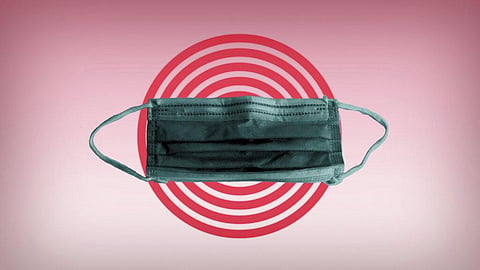Vaccine or not, mask is here to stay
BENGALURU: Given the tragedy and havoc that SARS-CoV-2 has wrought across the world, a vaccine against Covid-19 has almost acquired the halo of a panacea, a cure-all that would restore life as we knew it. Experts however, point out that there is much we still don’t know and that washing hands, wearing masks, and maintaining physical distance will be required even after the immunisation programme begins.
The efficacy of vaccines being developed across the globe ranges between 70-95%, but experts say that getting a shot does not mean that people abandon all caution, not just because the best test for a vaccine’s effectiveness will be in the real world, but also because the immunisation drive would last several months.
“A vaccine only prevents someone from getting symptoms, or protects from developing a serious form of the disease.
There is no guarantee that a vaccinated person will not transmit the virus to another person. There are many asymptomatic people, who have no symptoms but the virus is present in their nasal passage. When they breathe, cough or sneeze, they can still transmit the virus to others,” said Dr Giridhara Babu, epidemiologist and member of the state’s expert committee on Covid.
Dr Babu also said that how long the protection of the vaccine will last is still not known. “(So) we need to continue to take all precaution. Wearing masks will also help prevent respiratory diseases,” he added.
Several vaccines in development are to be administered in two doses which could be several weeks apart. This also affects immunity, said Dr Sunil Kumar K, senior consultant for interventional pulmonology at Aster CMI Hospital. “After the first dose, there is only about 56% efficacy in terms of the virus getting transmitted, and 94% efficacy is achieved only after two months of vaccination. During this period people who have been vaccinated still need to be cautious and are required to continue wearing masks and follow physical distance measures,” he said.
Dr Jagadish Hiremath, medical director at Ace Suhas Multispecialty Hospital said that many variables affect individual immunity and virus transmission. “The vaccine will increase antibodies which will circulate to the nasal mucosa and stand guard there.
But it’s not clear how much of the antibody pool can be mobilised (by the body) or how quickly. If the answer is: ‘not much’, then viruses could bloom in the nose and be sneezed or breathed out to infect others. A lot of people are thinking that once they get vaccinated, they won’t have to wear masks any more. But it’s critical for them to know that they have to keep wearing masks, because they could still be contagious.”

